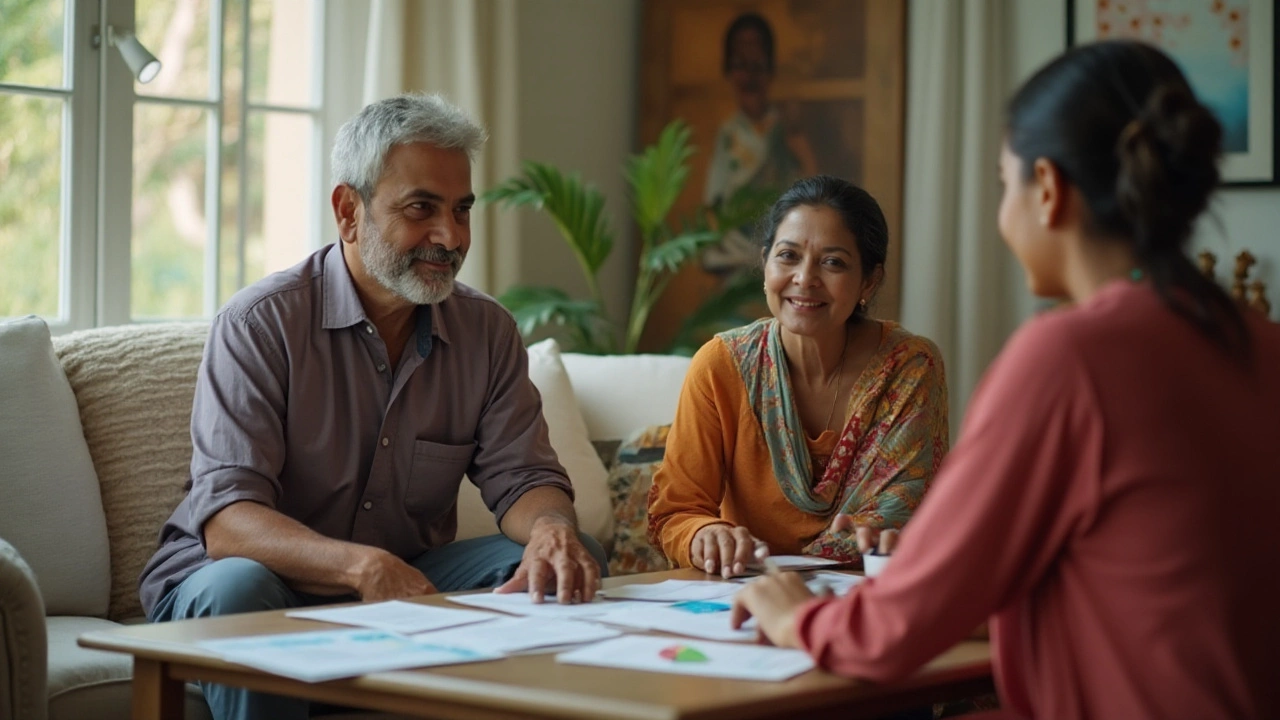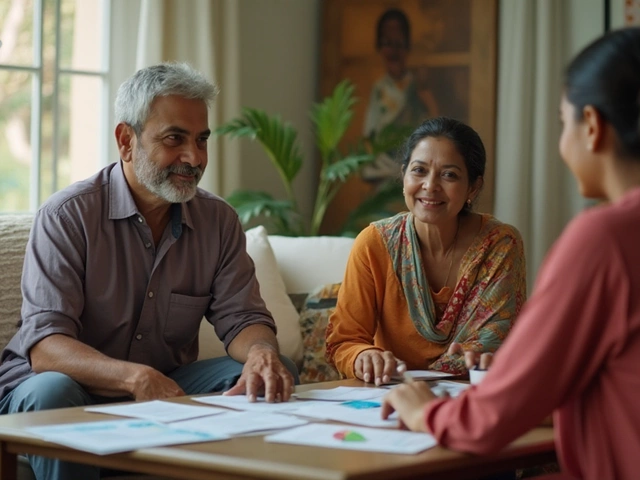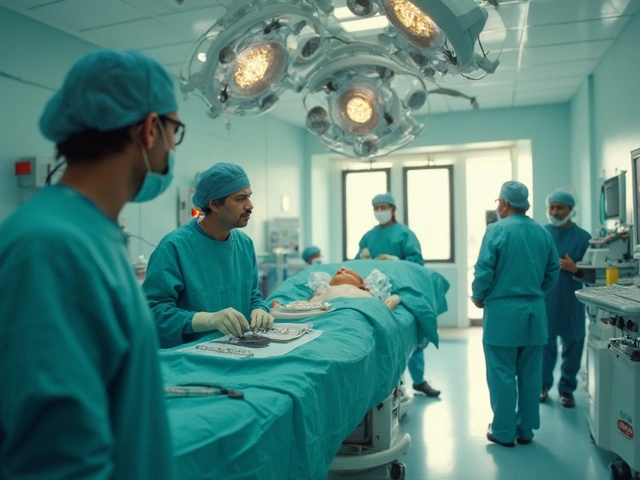- Home
- Health And Wellness
- Living Independently After Open-Heart Surgery: A Comprehensive Guide

Living Independently After Open-Heart Surgery: A Comprehensive Guide
Open-heart surgery is a significant event in anyone's life, marking both a time of challenge and a period of opportunity for healthier living. Whether you've undergone a bypass, valve repair, or a more complex procedure, the journey to recovery is uniquely personal. One common question that arises is, 'When can I live alone again?' This consideration involves many factors, from physical healing to emotional readiness.
In this article, we delve into these aspects, drawing on insights from medical professionals and personal experiences shared by those who have walked this path. What does it take to live independently after surgery? While every recovery journey is distinct, certain benchmarks can guide you in assessing your readiness to embrace independent living once more.
- Understanding Open-Heart Surgery
- Typical Recovery Timeline
- Physical and Emotional Readiness
- Tips for Independent Living
- When to Seek Help
Understanding Open-Heart Surgery
Open-heart surgery is a complex procedure that has saved countless lives around the world. At its core, this surgery involves opening the chest to operate directly on the heart. It’s often used to treat conditions such as coronary artery disease, heart valve issues, and congenital heart defects. Some of the most common types of open-heart surgeries include coronary artery bypass grafting (CABG), valve replacement or repair, and surgeries related to repairing defects or aneurysms. The development of these surgical techniques marks a monumental achievement in medical science, allowing people to extend and improve the quality of their lives significantly.
Before diving into the process of the surgery, it’s essential to understand what necessitates such a drastic measure. People who have significant blockages in their coronary arteries may not find relief through medication or lifestyle changes alone. As a result, open-heart surgery serves as a critical intervention to restore normal blood flow and prevent life-threatening events like heart attacks or strokes. Despite the nerves that might accompany the thought of surgery, these procedures are incredibly controlled and executed by skilled teams of cardiac surgeons who’ve undergone extensive training.
During the procedure, the patient is often placed on a heart-lung machine that takes over the responsibilities of circulating blood and breathing for the patient, allowing surgeons to perform the intricate work without the heart pumping. Interestingly, advances in technology and medical practices have made it possible to perform some surgeries on a beating heart. This is particularly beneficial in reducing the time required for recovery and hospital stay. Recovering from open-heart surgery involves a comprehensive understanding of what the body undergoes and how to best care for both the physical and emotional aspects of oneself post-surgery.
As Dr. Jane Sommers, a renowned cardiac surgeon, states, "The journey to recovery after heart surgery isn’t just a physical one—it's deeply emotional. Helping patients understand this is critical in their full recovery process."
Survival rates and safety continue to improve as techniques advance and medical knowledge expands. Recovery involves a stay in intensive care for close monitoring, followed by a period where the focus is on healing the surgical wound and regaining strength through specialized care plans. It's crucial for patients to be fully engaged in the recovery process, learning about their condition and developing a partnership with their healthcare providers. Such knowledge empowers them to effectively manage their health and potentially return to living alone sooner after surgery.
Typical Recovery Timeline
After undergoing open-heart surgery, patience becomes your new best friend as recovery is a gradual process. Each patient's journey is unique, but there are common milestones most people can expect. Within the initial days post-surgery, the majority of patients spend several days in the intensive care unit. Here, the focus is on monitoring heart function closely and ensuring there are no complications. It is normal to feel a mix of relief and anxiety as the anesthesia wears off, with health professionals frequently checking vital signs and leverage technology to facilitate recovery.
As you move out of intensive care, usually within a week, the physical aspects of healing take center stage. Pain management is a primary concern, and medications are administered routinely to keep discomfort at bay. Surgeons often use drainage tubes to prevent fluid accumulation around the heart, and these are typically removed during this phase, which can last until approximately ten days post-surgery. Patients start gentle movements under supervision to prevent blood clots and ensure circulation—a crucial step towards regaining independence.
By the third week, most individuals confront a critical juncture in their recovery. Energy levels may fluctuate, and emotional swings are quite common. Patients might feel frustrated by their dependence on others and the temporary restrictions imposed by their condition. Engaging in light activities like walking can foster both physical and emotional healing. Dr. Cardiel, a well-known cardiologist, emphasizes, "It's a marathon, not a sprint; you'll need to pace yourself smartly." The road to independent living is built step by step on elements of patience and resilience.
| Recovery Stage | Typical Duration |
|---|---|
| ICU Stay | 3 to 5 days |
| Hospital Discharge | 7 to 10 days post-surgery |
| Return to Light Activity | 3 to 4 weeks after surgery |
| Resume Normal Routine | 6 to 8 weeks after surgery |
As patients enter the six-week mark, many begin to feel more like themselves, gradually integrating into their regular routines as healing progresses. You might be cleared to drive and partake in leisure activities, but this determination rests on a medical evaluation. Palpably, returning to work or strenuous tasks might not be possible until eight weeks or later, contingent upon the nature of one's occupation. At this stage, a comprehensive cardiac rehabilitation program is often recommended, offering structured support as you transition back to an active life and focus on sustainable heart health.
Finally, by two to three months post-surgery, a considerable number of patients live alone with confidence. They have re-established independence, although ongoing check-ups are essential for monitoring heart health. Navigating life after heart surgery requires a blend of patience, diligence, and a proactive mindset to prevent complications and foster recovery. The journey is different for everyone, with some experiencing enhanced quality of life much sooner than anticipated.

Physical and Emotional Readiness
Recovery from open-heart surgery is not just about mending incisions or returning to a normal heartbeat. It's a journey that demands strength both physically and emotionally. Physically, your body needs time to heal after such an invasive procedure. The sternum, which is often split during the surgery, can take several weeks to heal properly. During this time, even daily activities such as lifting a bag of groceries or reaching for something on a high shelf can be challenging.
Medically, most surgeons advise avoiding heavy lifting or strenuous activity for at least six weeks post-surgery. A careful balance of rest and rehabilitation is pivotal. Gradual physical activity, often in the form of a cardiac rehab program, is crucial to rebuilding strength and stamina. Such programs, guided by medical experts, focus on safe exercises tailored to your recovery pace. Including activities like walking and stretching, rehabilitation helps resuming daily life at a comforting pace.
Emotional readiness is equally essential, yet often overlooked during the recovery process. Having battled such a serious health challenge, individuals may experience waves of emotions ranging from relief and gratitude to anxiety and fear of recurrence. It's not uncommon to feel vulnerable or fear living alone initially. Maintaining a supportive network of family and friends can significantly aid in this aspect of recovery. Subtle support measures like regular check-ins or help with household chores can make a considerable difference.
Addressing the Emotional Aspect
Coping with the emotional impact necessitates an open dialogue about your feelings and potential post-surgery challenges. Professional support, such as a therapist or a support group of those who have undergone similar surgeries, might be beneficial. These professionals or peers provide perspectives that resonate deeply and offer validation for the feelings you’re experiencing. A trusted healthcare provider can also guide when emotional therapy or counseling may be needed. Engaging in relaxation techniques, such as mindfulness or gentle yoga, can help calm the mind and bolster emotional stability.
"It's important to understand that recovery involves learning what your body can handle, and that might change day-to-day. Listen to your body, make self-care a priority, and don't hesitate to reach out for help when you need it." – American Heart Association
The emotional roller coaster after a significant surgery is entirely normal. Accepting help when offered, either for physical tasks or emotional support, is critical. Forming new, healthy habits slowly provides a sense of control and assurance. Every small step counts towards rebuilding life independently after an open-heart surgery, leading towards healthier living. It might feel daunting at first, but with time, you will build confidence and resilience as you regain your independence.
Tips for Independent Living
Gearing up for independent living after you've had open-heart surgery is a significant milestone on your road to recovery. It's about regaining your freedom while ensuring that you maintain the highest level of safety and well-being. To start, assess your living environment. Make sure that your home is prepared for you in every sense. This might involve eliminating tripping hazards, such as rugs or cords, and organizing essential items at an accessible height, so you don't have to stretch or bend excessively. Setting up your environment thoughtfully can greatly enhance your independence and prevent unnecessary stress or injury.
Another critical aspect of living alone post-surgery is the establishment of a robust support network. While the desire to be independent is strong, having reliable people around you when needed is vital. Make it a point to stay connected with friends, family, or even neighbors who can check in on you regularly. You might also want to explore local community resources that offer services for individuals recovering from surgery. Simple measures like having a list of emergency contacts or using a medical alert system can also serve to reassure you and your loved ones that help is just a button away if needed.
Staying Physically Active
Physical activity plays a crucial role in your recovery journey after open-heart surgery. It's crucial to incorporate gentle exercises into your everyday routine, such as walking or prescribed physiotherapy exercises, based on what your doctor advises. This will not only speed up your recovery but also help maintain your body’s new normal post-surgery. Importantly, don't rush things; listen to your body's signals, and pace yourself to avoid overexertion. As you gain strength and confidence, you'll be able to take on more activities that promote your health and independence.
"Exercise is the key to physical health and mental tranquility," notes Dr. David Williams, a cardiovascular specialist who emphasizes the importance of gradual increase in activity post-surgery.
Nutrition and Medications
A major part of living independently and maintaining your health is adhering strictly to your medication schedule and dietary recommendations. Eating a diet that's heart-friendly is essential; focus on meals rich in fruits, vegetables, lean proteins, and whole grains, which are part of a balanced diet. It's helpful to plan meals in advance or use meal delivery services that cater to your dietary needs during your recovery phase. In terms of medications, setting up a system to remind yourself—like using a pill organizer or setting alarms—can assist in keeping up with your prescribed regimen without missing a dose.
Mental Wellness
Recovery from heart surgery can be as much of an emotional journey as it is a physical one. Addressing mental health is just as important as attending to physical health, so take time to understand and externalize your feelings. Connect with therapists who specialize in post-operative care or join support groups where you can share experiences with others in similar circumstances. Staying open about your emotions can help transform your healing experience, giving you strength and clarity to face each day.
In this way, stepping into independent living after undergoing such a major surgical intervention becomes not just a possibility but an achievable reality. It's a combination of taking action in your daily life and having the patience to allow your mind and body to heal comprehensively. With thoughtful preparation and consistent support, you can thrive in your journey of recovery and return to the life of independent living you envision.

When to Seek Help
After undergoing open-heart surgery, recognizing when to seek help is vital for your recovery. Many people feel the need to power through on their own, but understanding when to reach out can significantly enhance your healing process. It's important to listen to your body: if something feels amiss, chances are it's worth exploring. One key time to seek assistance is if you notice signs of infection at the incision site, such as persistent redness, swelling, or unusual discharge. These symptoms may be indicative of an infection that requires medical attention promptly to prevent complications.
Emotional wellbeing is equally crucial. Open-heart surgery can be an emotionally taxing experience, and feelings of anxiety or depression are common. If you find that your mental health is impacting your daily life, reaching out to a mental health professional is a courageous and wise step. Engaging with support groups, either in-person or online, can also provide a community of understanding and shared experience. As one patient famously noted,
"You are not alone in this journey; there's a vast community walking the same path."
Practical signs for when to seek help often relate to physical stamina and mobility. Trust your instincts. If daily activities such as walking up the stairs or lifting light items become disproportionately exhausting, it might be time to consult with your healthcare provider. A sudden change in your ability to perform these tasks can signal various issues, some of which might need professional intervention. It is advisable to keep a diary of such experiences to provide your medical team with a clear picture of your progress and any setbacks.
Support networks, including friends and family, can play a significant role in recognizing when you might need help. They usually notice changes in your demeanor or routine that you might overlook. Engaging them in discussions about your recovery and asking them to voice any concerns can assist you in staying on track while living alone. Staying proactive by scheduling regular check-ups ensures professional oversight on your road to recovery.
Stress can make you hesitant to seek the help you need. Financial concerns, pride, or simply the desire to be independent might cloud your judgment. However, it's crucial to remember that seeking help early can prevent minor issues from escalating into major setbacks. In the landscape of modern medicine, recovery is not a solitary endeavor; it's a communal effort built on collaboration between you, your healthcare team, and your loved ones.

Arnav Singh
I am a health expert with a focus on medicine-related topics in India. My work involves researching and writing articles that aim to inform and educate readers about health and wellness practices. I enjoy exploring the intersections of traditional and modern medicine and how they impact healthcare in the Indian context. Writing for various health magazines and platforms allows me to share my insights with a wider audience.
About
Medical Resource Center India is a comprehensive online platform dedicated to providing reliable health information and medical resources in India. Explore a wide range of articles, tips, and advice on medicine, healthcare services, and wellness. Stay informed about the latest developments in Indian medicine and access valuable insights into maintaining a healthy lifestyle. Discover expert guidance and health solutions tailored for every Indian citizen. Your go-to destination for authoritative medical knowledge in India.



